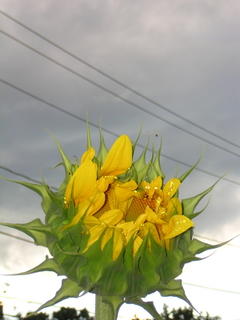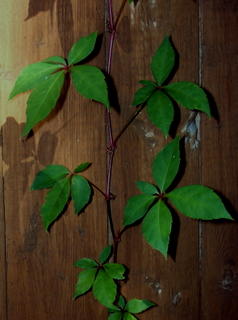Breath
 This so-called weed, this lamb's-quarter, took root in a two foot high pile of crushed stone. Like the crab-grass growing behind it, this is a terribly tenacious plant. It will not be denied footing, life, even on the barest of possible landscapes. And it can sprout, offer up a colorful set of leaves, and probably even flower and seed right here. This barren landscape of stone dust. This is where it begins, pioneers on rock, converting minerals to flesh and cell, dropping organic matter. Over eons, soils and diversity. Even asphalt cannot keep it back for long. Life persists with a certainty beyond all else on this planet. Not human beings, necessarily, or even mammals, but life is the true constant here. But what is life? Is it in the arrangement of matter, or is it something transcendent? From where comes this impulse, this craving, these magical combinations of processes. Is life this growing thing? This weed? Or is life the thing that grows this thing? What presses on, exactly?
This so-called weed, this lamb's-quarter, took root in a two foot high pile of crushed stone. Like the crab-grass growing behind it, this is a terribly tenacious plant. It will not be denied footing, life, even on the barest of possible landscapes. And it can sprout, offer up a colorful set of leaves, and probably even flower and seed right here. This barren landscape of stone dust. This is where it begins, pioneers on rock, converting minerals to flesh and cell, dropping organic matter. Over eons, soils and diversity. Even asphalt cannot keep it back for long. Life persists with a certainty beyond all else on this planet. Not human beings, necessarily, or even mammals, but life is the true constant here. But what is life? Is it in the arrangement of matter, or is it something transcendent? From where comes this impulse, this craving, these magical combinations of processes. Is life this growing thing? This weed? Or is life the thing that grows this thing? What presses on, exactly?We are learning some lessons these days. 850 are trampled or drown in Iraq because of uncertainty. Thousands are dead and more than half a million are homeless in our our own home-grown refuge crisis, Hurricane Katrina's landfall at the mouth of the Mississippi. The images on the news are of African Americans and poor white people huddled in stadiums and bused hundreds of miles to other stadiums. Houses filled to their soffits with water. There is a 30% unemployment rate in New Orleans. There was. Now it is 100%. There are levels of inequality that derive from the general distribution patterns of ecosystems, systems of life. And there are levels of inequality that exceed our natural right, that perpetrate a terrible injustice. Our culture seems to specialize in the latter, which, in turn, seem only to compound the former.
In Argentina, world forgotten, they pray for peace every night in quiet studios, in small groups. In Japan, the same mantras are chanted, and in India and Iran. A silent majority, humanity-minded, waiting their turn. May all people be peaceful, may they have hope and enrichment. May the future bring us better days.














